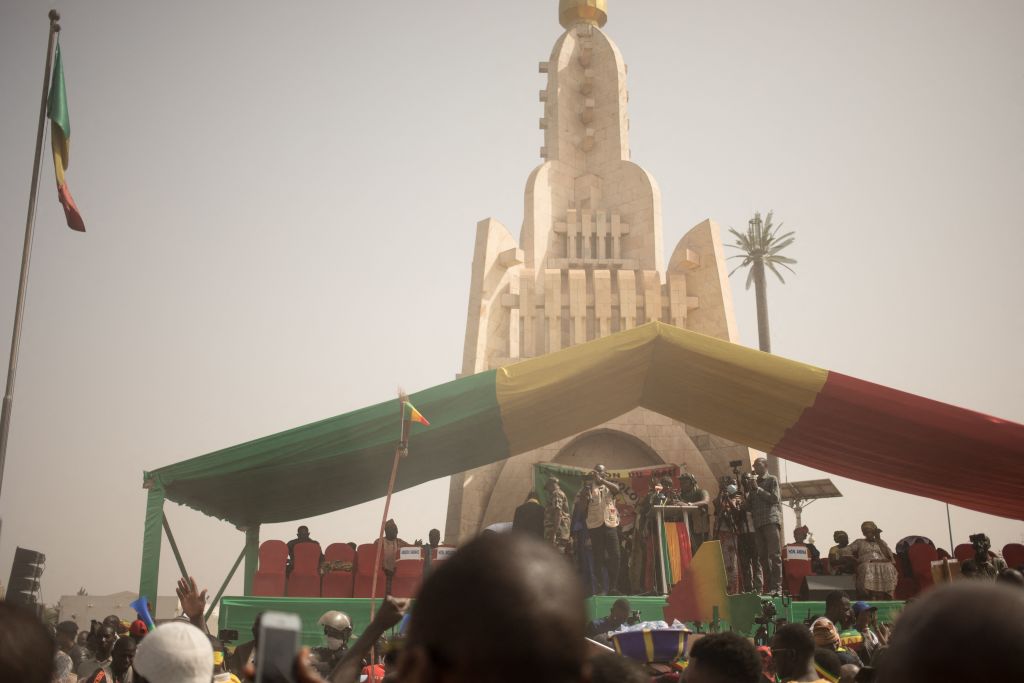ADF STAFF
Mali’s ruling junta took power in 2021 proclaiming that it would do what previous leaders had not: put an end to extremist terror in the country. Two years later, the junta has little to show for its efforts and has begun to repress citizens who criticize the lack of success.
One recent example of the junta’s turn was the sentencing in September of influential social media figure Adama Ben Diarra, also known as Ben the Brain. Diarra supports the junta, which appointed him to Mali’s interim parliament, the National Transitional Council. He was arrested in August when he criticized the junta’s management of the country and its decision to postpone the promised return to civilian government.
Diarra was prosecuted for damaging the state’s credibility and sentenced to two years in prison. He is appealing his conviction.
The Sahel’s three recent coups — in Burkina Faso, Mali, and Niger — are following similar patterns as coup leaders find themselves facing the same extremist violence that vexed their democratically elected predecessors and a public growing disillusioned with their rule.
In Burkina Faso, deaths from extremist attacks have tripled since the October 2022 coup that installed Capt. Ibrahim Traoré as the junta leader. Traoré claimed to have foiled a countercoup in September.
The junta’s promise to rout extremists in two to three months has now stretched into more than a year during which the military has effectively lost control over the country’s north and east.
“The security situation is fragile,” Lompo Alassane, civil society coordinator in the provincial capital of Fada N’Gourma in eastern Burkina Faso, told German broadcaster DW. “Some areas are not accessible. We can’t move beyond a certain radius from the big cities.”
Burkina Faso’s poorly trained and lightly armed Volunteers for the Defense of the Fatherland (VDP) have taken heavy losses in battles with extremists. Forty died in July and another 36 in September. VDP fighters were also implicated in the extrajudicial killing of 150 civilians this year in Yetenga province.
A sharp increase in extrajudicial killings of civilians has become a hallmark of Traoré’s rule, according to rights groups and residents.
In Niger, extremist violence also has increased since the coup. A dozen soldiers died in an extremist attack in the Tillaberi region in September. Junta leaders claim soldiers killed 100 extremists in that firefight, but that number has not been confirmed.
So far, the Nigerien junta has faced less criticism within the country than its neighbors. However, it has also put down protests supporting deposed President Mohamed Bazoum while letting pro-coup rallies go forward. Experts say the public tone could change as it has in Mali and Burkina Faso as the security situation continues to deteriorate. The junta has pledged to return to democracy in three years.
Further complicating the situation in the Sahel is the presence of Russia’s Wagner Group mercenaries. The Malian junta invited the group to train its soldiers and help put down insurgents. After its arrival in December 2022, Mali’s reported human rights violations jumped tenfold.
In practice, Wagner’s heavy-handed tactics have made Mali’s security worse, most notably after the three-day assault on a market in the community of Moura in March 2022. The assault, in conjunction with the Mali military, led to the summary executions of more than 300 men, many of them from the Fulani ethnicity. The Moura massacre was part of 500 deaths attributed to Wagner in Mali in the first half of 2022.
“Within fragile states, Wagner regularly fosters instability by committing acts of indiscriminate violence and human rights abuses,” researcher Anthony Marco wrote in an analysis published by the website Irregular Warfare.
Wagner’s involvement in Moura and other regions inspired more attacks from extremists, including against the nation’s largest military base. Fighters with al-Qaida affiliated Jama’at Nusrat al-Islam wal Muslimeen justified the attack as payback for working with Wagner.
“We say to the Bamako government: if you have the right to hire mercenaries to kill the defenseless innocent people, then we have the right to destroy you and target you,” it said.

